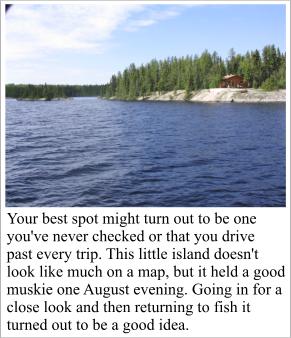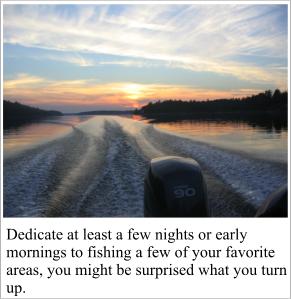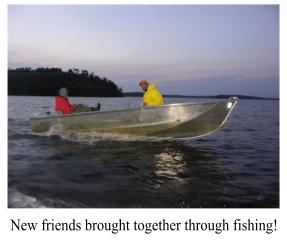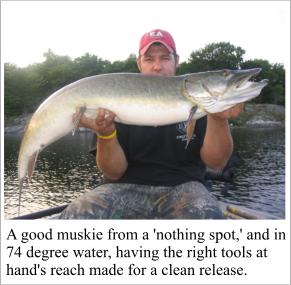Five Things To Try This Season
by J.P. Bushey
Open water fishing is just around the corner!
Before every new, open-water season starts, I normally set an informal
list of things I want to try. Some items on the list quickly turn into
time well spent, some don't, and others longer to bear fruit. At any rate,
listed below are a few ideas that have really worked out well. With any
luck, one or more might work for you, or get you thinking of a list of
your own.
 Fish
A New Spot Every Day. Fish
A New Spot Every Day.
It doesn't matter if it's a local pond small enough to spit across or a
huge lake or river system. On big water especially, there are more
potential spots than you could learn in ten lifetimes of exploring. Every
trip, go in with the goal of checking and learning a new one. Even if it
turns out to be a dud, you've still helped yourself: you've eliminated a
piece of the puzzle. You can at least move on. It's like the old saying
about carving a bird out of a block of wood. The bird's already in there,
all you're doing is removing the wood you don't need. You might use maps
or GPS to lay out new routes to explore, or it might simply be a matter of
pulling up and checking areas you've blown by trip after trip. I've done
both. Some spots that look awesome on paper turn out to be poor, and vice
versa. Some of the best spots I've located are ones I picked against a
map's advice. With even the quality charts always remember, they're very
broad strokes at best. Not only with respect to depth, but rock
formations, weeds, cover and spot make-up overall. You'll never know just
how good that shallow point is until you bounce a lure down it or actually
inspect it with your graph or polarized glasses. I have no doubt that the
best spots on the waters I fish are yet to come. And the really good ones
we fish were a result of checking them out and taking a little risk now
and again. In the dog days of summer especially, peak periods of fish
activity (depending on the lake type or species) might be limited to
certain windows during the day or night. Whenever possible, use 'downtime'
to hunt around. The only way to know if a new area is a winner is to
return and work it over once conditions get better.
At Least Once, Fish Your Favorite Spots One
Hour After Dark and One Hour Before.
You can learn a ton about a lake by staying out after dark or arriving
just before daylight. On water that gets heavy fishing pressure or
recreational boat traffic, these might well be the best times to fish
anyway. Insect life, plankton, crustaceans, diving birds and forage are at
their peak activity levels. You've got an
 excellent
shot at good fishing and learning subtle predator-prey details that can
help you a lot. Stuff you can easily miss at midday when the activity dies
off or spreads out and the lake gets busier. On smallmouth lakes, check
shallow shorelines with rock rubble using a powerful spotlight. Some will
be exploding with wandering crayfish while others are quieter. It's
amazing how spots bristle with life in the dark. Juvenile rockbass and
sunfish appear out of nowhere, and so do a range of larval insects, like
caddis. At some times of the year, you might spook a few walleyes, a
muskie or bass in there, too. Night fishing on Georgian Bay one June, we
pulled into a cove on the deep side of an island about 11pm and were soon
surrounded by thousands of skipping, splashing baitfish. One stuck to my
crankbait on the way in. It was an alewife. They were spawning in there in
huge schools. Any guesses which general area produced our biggest lake
trout, walleye and pike and smallmouth of the season over the next couple
weekends? Forage species like smelt and herring also do their spawning
after dark. Areas that draw these migrations are worth knowing about. Just
like fishing a new spot as mentioned above, definitely make time to check
some of your favorites after or before dark whenever your fishing schedule
permits. Obviously use caution and common sense when you do it. I find
when it's dark, my other senses really heighten too. The action of your
lure or its sound gets magnified in your hands or ears, and any little
ticks that might be a high spot on a rock pile or weed patch seem to jump
right out at you. I pay closer attention to my graph when trolling in the
dark, too. excellent
shot at good fishing and learning subtle predator-prey details that can
help you a lot. Stuff you can easily miss at midday when the activity dies
off or spreads out and the lake gets busier. On smallmouth lakes, check
shallow shorelines with rock rubble using a powerful spotlight. Some will
be exploding with wandering crayfish while others are quieter. It's
amazing how spots bristle with life in the dark. Juvenile rockbass and
sunfish appear out of nowhere, and so do a range of larval insects, like
caddis. At some times of the year, you might spook a few walleyes, a
muskie or bass in there, too. Night fishing on Georgian Bay one June, we
pulled into a cove on the deep side of an island about 11pm and were soon
surrounded by thousands of skipping, splashing baitfish. One stuck to my
crankbait on the way in. It was an alewife. They were spawning in there in
huge schools. Any guesses which general area produced our biggest lake
trout, walleye and pike and smallmouth of the season over the next couple
weekends? Forage species like smelt and herring also do their spawning
after dark. Areas that draw these migrations are worth knowing about. Just
like fishing a new spot as mentioned above, definitely make time to check
some of your favorites after or before dark whenever your fishing schedule
permits. Obviously use caution and common sense when you do it. I find
when it's dark, my other senses really heighten too. The action of your
lure or its sound gets magnified in your hands or ears, and any little
ticks that might be a high spot on a rock pile or weed patch seem to jump
right out at you. I pay closer attention to my graph when trolling in the
dark, too.
 Meet
And Fish With A New Partner. Meet
And Fish With A New Partner.
Man, has the Internet ever made this easy to do! A lot of the people
I've met in the online fishing community are not only great fishermen,
they've also become lifelong buddies. If you've got something new you want
to learn about, chances are good that a reputable and willing teacher is
an email away. Meet up and get out there! This is a great way to safely
learn new water or learn a new method. Want to see how to fish for
rainbows with a Dipsey Diver on the Great Lakes? What about learning how
to flip for largemouth? Contact the guys with the good reports. 'Trip
Sharing' is a great way to learn. Maybe Mr. Great Lakes wants to learn
about fly fishing or whatever it is that you happen to specialize in.
Trips will follow, and so does learning and friendship. Playing Guide for
a day or two is lots of fun, and being guided is great too. No money
changes hands in either case, and you both win. You can read all the
articles and watch all the TV shows you want. Nothing will teach you how
to do something like seeing someone do it and then doing it yourself.
You're going to find that most people love to teach, and love sharing
knowledge.
The One-Bait Day.
Along the same lines, is there a bait, lure or technique you want to
master? Take a day or two and just rig up with it and it alone. Nothing
teaches better than practice and experience. Just like eliminating
marginal water in the opening tip, what's the harm in a fishless day if
you've still learned the ins and outs of a new way to fish? It's time well
spent. Maybe it's lipless crankbaits for bass and pike, maybe slip bobbers
for walleye or learning to downrig for lake trout. Set out with the goal
of learning as much as you can. The overlap between presentations and the
fish that will respond to them is huge. While throwing that lipless
crankbait, you might not catch largemouths in the shoreline weeds, but
with that lure in the water all day and no others to swap it for, you
might try fishing it deeper down a rocky island and hit a big pike.
Success is success. Always remember a huge percentage of the baits and
techniques we use aren't species-exclusive. The best ones are versatile,
capable of being used in different ways and for just about any type of
fish. If there's something you want to get good at, push yourself to learn
as much as you can about it. This takes time. In lots of cases, you might
miss the target species you're targeting but luck out with another. No
harm in that. The temptation to cut learning short can be pretty strong
when you can pick up another rigged rod or reach into a tackle box. For
me, big, soft plastics like the Bulldawg for muskies and are the
challenge. I clip one on and fish it. I've caught everything but a muskie
on them and my confidence is there. I plan on devoting more time to them
again this season.
Reevaluate And Upgrade Tools in Your Boat or
Tackle Kit.
Specifically, the tools you use every day on the water while fishing.
Pliers, jaw spreaders, hook files, measuring devices, knives, split ring
pliers, hook-cutters, stringers and flashlights are all dirt cheap when
compared to the cost of most other fishing-related items. Tools that are
rusted, broken, dull or lost all together aren't going to do you much good
when you need them. In the boat, I keep them all in the same place every
trip. And I have spares on hand at all times. This kind of gear takes up
next to no space, so it's easy to store. But also easy to misplace!
Sturdy, well lubricated pliers are one of the most important. Kept free of
rust, they're easy to use with one hand for un-hooking fish or fixing
lures. Same deal with knives. I have one handy at all times and it's razor
sharp. Office supply stores sell packages of box-cutters for next to
nothing. They're cheap, razor sharp and excellent for neatly trimming
knots, modifying soft plastics and all sorts of stuff. They're all over my
boat, and I have at least one in the pocket of every fishing sweater or
jacket. A big, foam bobber or chunk of wood dowel tethered to your pliers
or jaw spreaders will keep them safe when they wind up overboard. They
will. Small, tight-sealing tubs work great for storing your day-to-day
fishing tools. I keep them tucked away between trips, but they're always
set aside (in the same spot on the boat deck, too) every time the lines go
in. Having to dig around for the right tool can be messy and tough on
fish, too. Forgetting the pliers might seem like nothing after remembering
to top up the gas, charge the batteries, the bait and the lunch. But what
do you do when you've got a deep-hooked fish in the net or worse yet, a
hook in yourself? Or, have you ever tried replacing a 7/0 treble hook onto
bait in December with no split ring pliers? Make sure you've got the
tools, make sure they work, and know exactly where they are.

And that's about it. Everything you do on the
water is for one singular reason: enjoyment. If there's anything you want
to try this season, I say go for it. The thrill is the hunt. Learning
something new, meeting someone new or just getting the most out of an old
reliable is what makes fishing what it is. Learning, teaching,
experimenting and being prepared to take a gamble every now and again
really enriches the whole process. There's still lots of ice left and
that's the good news. A few more fish to catch in the March sun, and a few
more long nights to plan and organize for your best season yet.
|


 Fish
A New Spot Every Day.
Fish
A New Spot Every Day. excellent
shot at good fishing and learning subtle predator-prey details that can
help you a lot. Stuff you can easily miss at midday when the activity dies
off or spreads out and the lake gets busier. On smallmouth lakes, check
shallow shorelines with rock rubble using a powerful spotlight. Some will
be exploding with wandering crayfish while others are quieter. It's
amazing how spots bristle with life in the dark. Juvenile rockbass and
sunfish appear out of nowhere, and so do a range of larval insects, like
caddis. At some times of the year, you might spook a few walleyes, a
muskie or bass in there, too. Night fishing on Georgian Bay one June, we
pulled into a cove on the deep side of an island about 11pm and were soon
surrounded by thousands of skipping, splashing baitfish. One stuck to my
crankbait on the way in. It was an alewife. They were spawning in there in
huge schools. Any guesses which general area produced our biggest lake
trout, walleye and pike and smallmouth of the season over the next couple
weekends? Forage species like smelt and herring also do their spawning
after dark. Areas that draw these migrations are worth knowing about. Just
like fishing a new spot as mentioned above, definitely make time to check
some of your favorites after or before dark whenever your fishing schedule
permits. Obviously use caution and common sense when you do it. I find
when it's dark, my other senses really heighten too. The action of your
lure or its sound gets magnified in your hands or ears, and any little
ticks that might be a high spot on a rock pile or weed patch seem to jump
right out at you. I pay closer attention to my graph when trolling in the
dark, too.
excellent
shot at good fishing and learning subtle predator-prey details that can
help you a lot. Stuff you can easily miss at midday when the activity dies
off or spreads out and the lake gets busier. On smallmouth lakes, check
shallow shorelines with rock rubble using a powerful spotlight. Some will
be exploding with wandering crayfish while others are quieter. It's
amazing how spots bristle with life in the dark. Juvenile rockbass and
sunfish appear out of nowhere, and so do a range of larval insects, like
caddis. At some times of the year, you might spook a few walleyes, a
muskie or bass in there, too. Night fishing on Georgian Bay one June, we
pulled into a cove on the deep side of an island about 11pm and were soon
surrounded by thousands of skipping, splashing baitfish. One stuck to my
crankbait on the way in. It was an alewife. They were spawning in there in
huge schools. Any guesses which general area produced our biggest lake
trout, walleye and pike and smallmouth of the season over the next couple
weekends? Forage species like smelt and herring also do their spawning
after dark. Areas that draw these migrations are worth knowing about. Just
like fishing a new spot as mentioned above, definitely make time to check
some of your favorites after or before dark whenever your fishing schedule
permits. Obviously use caution and common sense when you do it. I find
when it's dark, my other senses really heighten too. The action of your
lure or its sound gets magnified in your hands or ears, and any little
ticks that might be a high spot on a rock pile or weed patch seem to jump
right out at you. I pay closer attention to my graph when trolling in the
dark, too.
 Meet
And Fish With A New Partner.
Meet
And Fish With A New Partner.